UNEVEN PRODUCTION COMBINES CARNIVAL AND ROMANCE
As part of Chicago’s yearlong celebrations marking the 400th anniversary of William Shakespeare’s death, Lyric Opera has mounted a production of Charles Gounod’s Roméo et Juliette. One of the French composer’s finest works, and an excellent example of French opera, it successfully debuted in 1867. Although the plot needs no introduction, it should at least be mentioned that, though Gounod’s librettists followed Shakespeare closely, they did shorten and condense the play, invent a new character (Romeo’s page Stephano), and alter the final suicide scene.
Director Bartlett Sher (currently represented on Broadway with Fiddler on the Roof and The King and I) sets the action during the 18th century in an atmosphere reminiscent of Venice’s famous Carnival. Unfortunately, his direction is somewhat hampered by scenery, property and costumes procured from The Metropolitan Opera. Catherine Zuber’s exuberant costumes take in a range of styles, some looking rather piratical, in a rather dark-hued palette of black, navy blue, purple, and crimson. Juliet, appropriately, stands out in bright pink and white dresses. Many cast members wear plague masks or circus costumes.
The chief problem lies with Michael Yeargan’s set design. Although his principal set looks great, it crowds the stage and leaves little room for dancing. (Gounod’s original ballet numbers have been cut.) More problematic still is that all of the action effectively takes place outdoors in the town square. There’s no ballroom for the opening scene, no garden from which Romeo can call to Juliet, no wedding chapel and no crypt in which to die. Sometimes these locations are evoked by lowering down religious art and bringing in a table and crucifix or laying a large white cloth across the stage, but such feeble touches seem amateurish in a world-class opera house.
Unevenness extends also to the casting of the leads. Soprano Susanna Phillips makes for an excellent Juliet, but Joseph Calleja’s Romeo is disappointing. The two do seem to have chemistry, at least, but their four duets fail to live up to the hype. Phillips captures Juliet’s youthfulness and immaturity in her nimble and flighty movements across the stage, carefree flinging of various objects, and breathtaking coloratura. Her appropriately unpolished, yet stunning, rendition of “Je veux vivre” in the first act sets the tone for what follows.
Calleja (who sings from February 22-March 8; Eric Cutler will sing the role from March 11-19) is simply too manly for the part of the impetuous, teenaged Romeo. His barrel chest and full-throated tenor would work great for singing Verdi, but less so for the rather lighter, more delicate French style of Gounod. Apart from a few peculiar high notes, which sounded as though there was something stuck in his throat, Calleja has an excellent voice. He does tend to oversing, though, especially during solo arias.
Of the many supporting principals, French mezzo-soprano Marianne Crebassa as Stephano deserves most praise. Her lyrical singing of “Que fais-tu, blanche tourterelle” beautifully captures Gounod’s flair for witty and melodic phrasing. Also making her Lyric debut is American mezzo-soprano Deborah Nansteel as Juliet’s nurse Gertrude, who adds a welcome measure of comedy to this tragic tale.
French conductor Emmanuel Villaume moves the music forward ever so deftly, keeping it wonderfully lithe and lively. Indeed, Romeo and Juliet comprises a gorgeous combination of Elizabethan drama and French Romanticism. Gounod’s delightful interpretation of the Shakespearean classic should be seen and enjoyed by all.
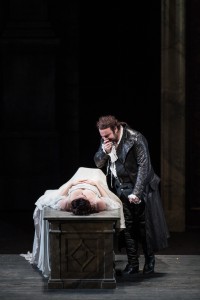 photos by Todd Rosenberg and Andrew Cioffi
photos by Todd Rosenberg and Andrew Cioffi
Romeo and Juliet
Lyric Opera of Chicago
Civic Opera House
20 N. Wacker Drive
ends on March 19, 2016
for tickets, call 312.827.5600 or visit Lyric Opera
for more Chicago Theater info,
visit Theatre in Chicago
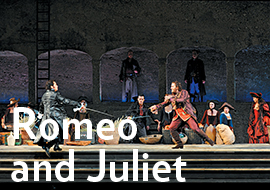
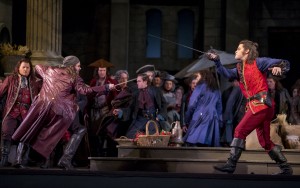
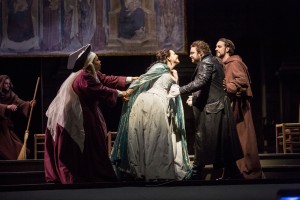
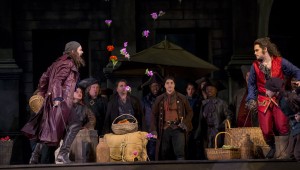
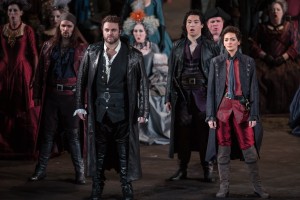
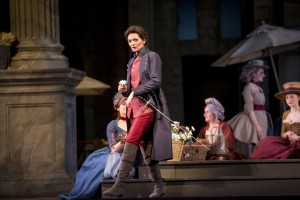
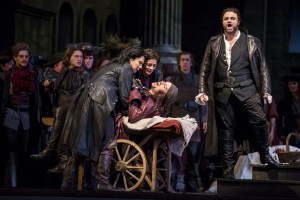
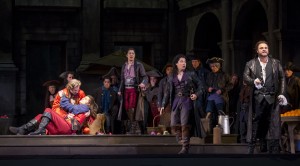
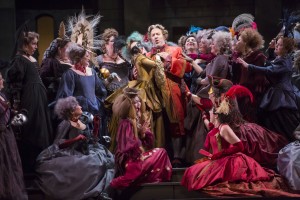
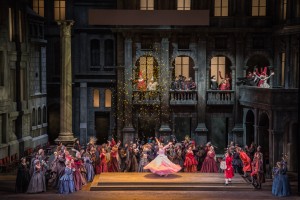
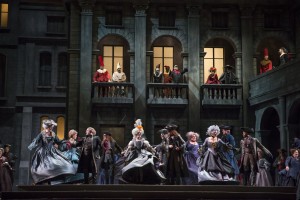
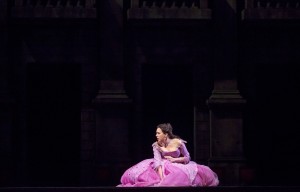
{ 2 comments… read them below or add one }
I saw Romeo and Juliet yesterday. It is a wonderful opera and their voices are beautiful.
Think it’s funny that you’re criticizing Mr. Calleja’s powerful voice. An opera singer must have that, as they are not ever mic-ed – even in huge opera houses. If you’d like someone with a lesser voice and more slight of stature, hire a teenager. He has one of the most beautiful tenor voices I’ve heard.